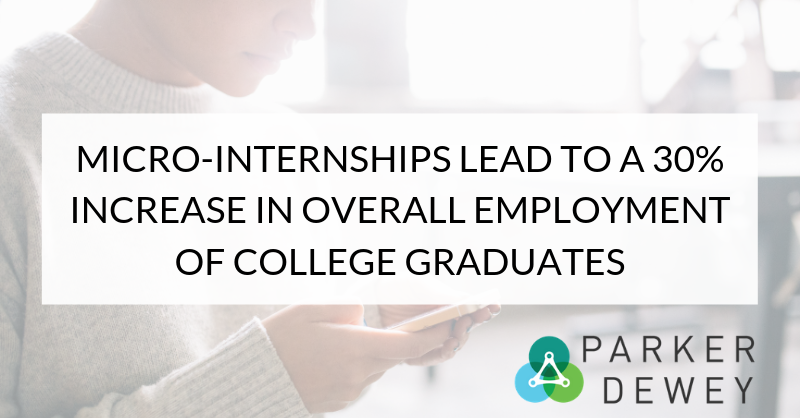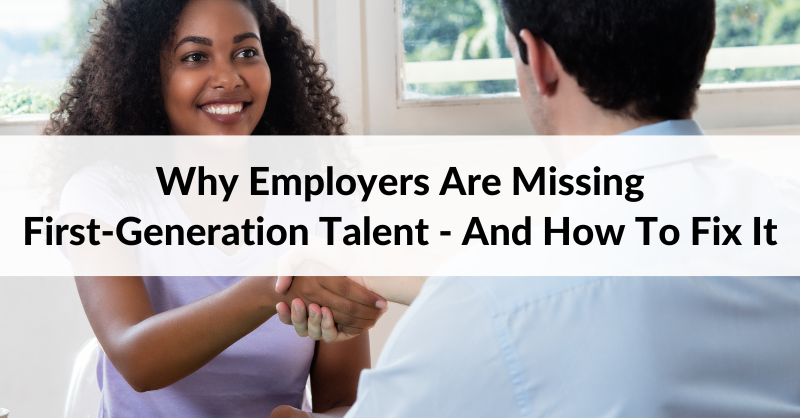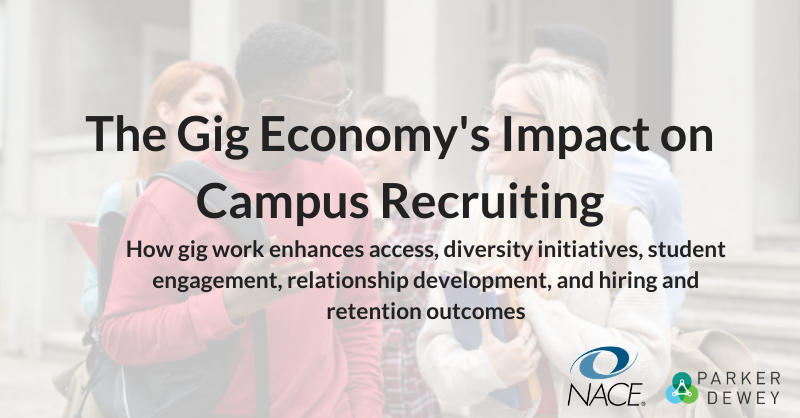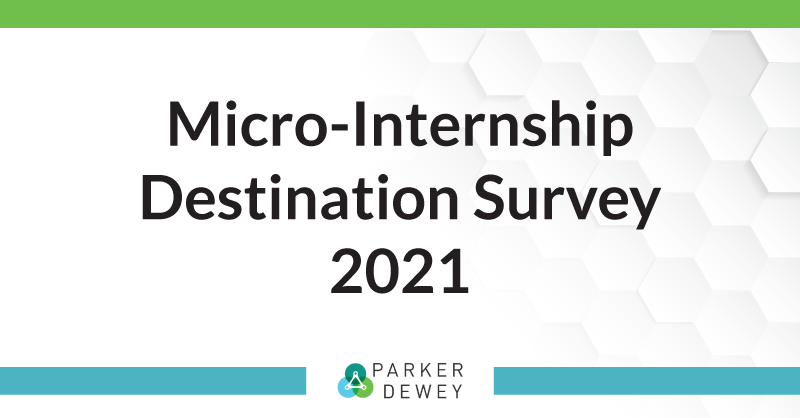
Micro-Internship Destination Survey 2021
It’s easy to grasp the short-term benefits of Micro-Internships: At the most basic level, busy professionals get work off of their plates, and college students and recent grads get paid. But how do Micro-Internships affect both companies and early-career talent down the road?
Our 2021 Destination Survey was designed to help us understand the career outcomes of recent graduates who completed at least one Micro-Internship. The results illustrated that Micro-Internships continue to:
- Support all recent grads entering the workforce, as well as expand access and create pathways for individuals who traditionally face more barriers in the workforce.
- Help students and recent graduates explore areas of interest before committing to an internship or full-time roles, ultimately promoting higher retention rates for employers.
- Provide ways for Career Launchers to engage with companies they weren’t otherwise considering, helping companies expand their reach beyond their existing talent pool.
- Support students and recent graduates in honing core skills, like communication, critical thinking, problem solving, and professional work ethic.
Read on for the full results!
Why Micro-Internships result in above-average hiring outcomes
Data shows that 55.3% of recent college graduates will leave their first job within the first year. That number is only expected to grow as The Great Resignation allows for easy early-career job-hopping. Through Micro-Internships, Career Launchers can explore different industries, roles, and companies—then evaluate what their preferred path may look like, based on valuable hands-on experience. This ultimately leads to higher retention for companies, who can be certain they’re bringing on a new hire who’s prepared with base knowledge and experience.
As Career Launchers shared,
- It was a great low-stress way to gain experience with a company before pursuing a full time role. Almost like a “tryout.”
- I was able to get my hands-on experience in my career field of choice.
- My Micro-Internship gave me a good insight into future career opportunities and outlook. It also helped me create a foundation for relationships that I can come back to in the future.
Micro-Internships help Career Launchers find jobs through skill- and relationship-building—and for some students, Micro-Internships can directly lead to a full-time role. In fact, more employers are intentionally using these short-term projects as a way to engage and audition potential candidates. (See our year in review for more statistics from 2021!)
- My Micro-Internship helped me establish what I wanted to do with my professional life. It helped me find my strengths, interests, and the work environment that best suited me.
- When selected for my Micro-Internship, my employer noticed skills that I had that would be better suited for a full-time role in a larger capacity than the Micro-Internship, and I was hired into a new role. All in all, Micro-Internships are a great way to find new talent.
- My Micro-Internships helped me realize that I enjoyed project-based assignments. I now work as a project manager.
“But how can I gain experience for my resume when no one will hire me without any experience?”
For those new to the workforce, landing that first job can feel daunting, or even impossible. Job ads, even those for entry-level roles, often call for multiple years of service: A recent analysis of almost 4 million jobs posted on LinkedIn since late 2017 showed that 35% of postings for “entry-level” roles asked for multiple years of prior relevant work experience.
79.4% of Career Launchers reported that their Micro-Internships helped them to gain experience for their resumes that drove their job offers. In their words,
- Micro-Internships gave me interesting examples to use in job interviews and put on my resume. I was able to answer questions about how I work with others and handle feedback with vivid examples.
- As someone who’d never done a [traditional] internship, I struggled applying for jobs out of college and I didn’t have a lot of experience to talk about. After the project, I had new, relevant experience to put on my resume, and that really interested my now-employer.
Beyond resume-building, here’s how Micro-Internships benefit Career Launchers:
When it comes to professional development, Micro-Internships help prepare Career Launchers to apply to jobs, prepare for interviews, make decisions around full-time roles, and build connections with new colleagues upon starting a new position. These low-stake opportunities also can help college students understand what it feels like to not get the job—allowing them to ask for feedback.
- It helped me gain an inside look into how different professionals work. Some companies move fast and need Micro-Interns who are there to work independently and send over results. Other companies move at a slow pace and need patience as Micro-Interns ask questions or nudge them for feedback.
- Micro-Internships have allowed me to understand what it feels like to not get the job. I think understanding failure is a very big learning aspect that most students don't experience until they are in the workforce. Plus, it let me evaluate how I presented myself to employers and I found opportunities to improve!
Micro-Internships encourage the development of core skills that are best built through active learning. Think adaptability, communication, and teamwork. These skills can help new talent work across teams, persevere through tricky professional challenges, and advocate for their own needs.
- My Micro-Internships helped me develop my understanding of professional communication and eased my shift from an academic setting to a professional one.
- My Micro-Internship helped me build remote working skills through communicating online (emails, Zoom calls, reporting out data, etc.).
- I built confidence in meeting new people and executing on their needs.
Career Launchers expressed how Micro-Internships allow them to feel like they’re making a valuable contribution to a company—and not just a transactional arrangement.
- My Micro-Internship helped me create a foundation for professional relationships that I can come back to in the future.
- I was able to bring my graphic design ideas to the table during my Micro-Internship. I didn’t feel like I was being looked down on as someone with little experience.
How Micro-Internships help build brand awareness
In a sea of attractive technology companies, start-ups, and big-name brands, certain companies and industries aren’t on the radar for many students and recent graduates. Micro-Internships can help connect Career Launchers to those spaces that maybe weren’t top of mind—like the banking and steel industries.
Career Launchers can also gain exposure to companies or fields they’ve never heard of, especially those located outside of their geographic region.
- Micro-Internships allowed me to explore various fields I may not have experienced otherwise.
- I enjoyed learning new skills in a field that I never thought I would be part of.
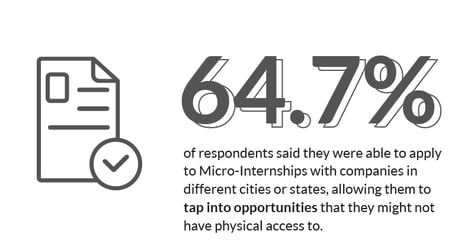 And because of the remote nature of most projects, 64.7% of respondents said they were able to apply to Micro-Internships with companies in different cities or states, allowing them to tap into opportunities that they might not have physical access to. In fact, this was a great opportunity for students who wished to return to their hometown upon graduation, but were being missed by the campus recruiting efforts of companies from those locations.
And because of the remote nature of most projects, 64.7% of respondents said they were able to apply to Micro-Internships with companies in different cities or states, allowing them to tap into opportunities that they might not have physical access to. In fact, this was a great opportunity for students who wished to return to their hometown upon graduation, but were being missed by the campus recruiting efforts of companies from those locations.
Ensuring access and inclusion in diversity recruiting
Given the challenges fueled by the pandemic, access to equitable career opportunities is more important than ever. One of the main objectives of Parker Dewey’s platform is to ensure early-career experience is accessible to all students and recent graduates, regardless of academic pedigree, social connections, geographic limitations, or time constraints.
Of the Career Launchers who responded to the optional demographic section,
- 62.9% identify as female, 25.7% identify as male, and 14.3% identify as non-binary or third-gender,
- 54.5% identify as being part of an underrepresented racial group, 18.2% identify as disabled, 36.4% are first-generation graduates, and 31.8% identify as LGBTQ+, and
- 88.7% are between ages 21-27, while 11% are between ages 31-50, largely representing a growing segment of adults returning to the classroom utilizing our platform.
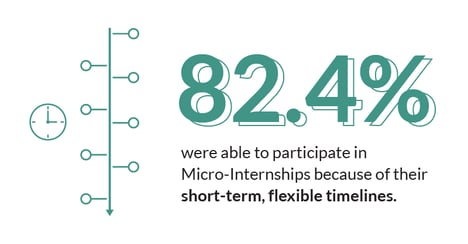
When asked about the accessibility of Micro-Internships, 91.2% shared they were able to apply and participate because they knew the opportunity would be paid—highlighting the necessity of paying talent for their time and work. And speaking of time as a form of currency, 82.4% of respondents said they were able to participate in Micro-Internships because of their short-term, flexible timelines. (We’ve covered previously some of the reasons why traditionally-structured internships aren’t an option for all early-career talent.)
We also asked respondents who identified as part of an underrepresented group to share in their words why Micro-Internships were a powerful tool for them. Career Launchers shared:
- Micro-Internships helped me pay rent for an apartment near my university while I finished my first degree without asking them for more financial help or taking on student loans. I was selecting companies based on what I could do that they would pay for, so the experience I gained was an added bonus. I think a lot of professionals see interns as free workers, not realizing that we’re paying our schools sometimes thousands of dollars to do for-credit internships. In reality, people in our shoes need value for our limited time. Money and experience together make it worth it—one of those alone is not enough.
- They were a powerful tool because they gave me access to companies that had employees that were just like me. It was nice to see successful companies like that, and feel like maybe one day I could be the CEO of a similar organization.
- As a disabled person trying to get into remote working, it was a big help.
- I felt comfortable and able to tell the employer that my legal name was not my preferred name and they were respectful of my pronouns.
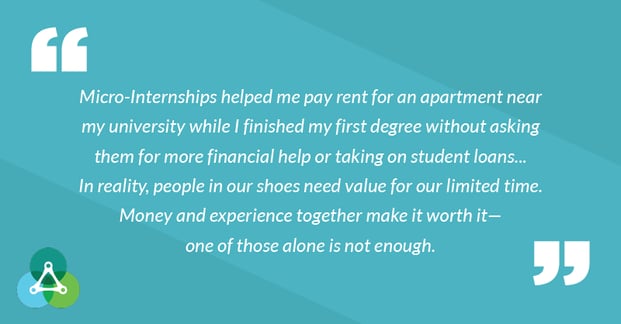
TL;DR: Micro-Internships are a win-win for employers and Career Launchers alike
Micro-Internships are so much more than just busy professionals getting work off their plate and college students getting paid. Micro-Internships lead to better hiring outcomes for everyone—from employers looking to fill their pipelines with early-career candidates, to students looking to gain professional experience while still in school. In particular, this year’s survey illustrated that Micro-Internships continue to create better and more equitable access and are a more efficient use of time, especially for students who don’t have the bandwidth to job search without pay. And finally, respondents overall rated Micro-Internships more highly than other recruiting tactics:
- Micro-Internships are better than career fairs because they offer you a chance to develop real skills and build connections. I think Micro-Internships are equal to, if not slightly more beneficial, than traditional internships, especially for those who lack experience and want to try out new things without a long-term commitment.
- I like the on-your-feet style of recruitment— that people can prove themselves through their work rather than their wordplay on their resume and in interviews.
- I found them to be much more beneficial and influential. I learned so much more through Micro-Internships than other recruiting activities.
- Micro-Internships actually provide you with hands-on experiences while being compensated for your time.
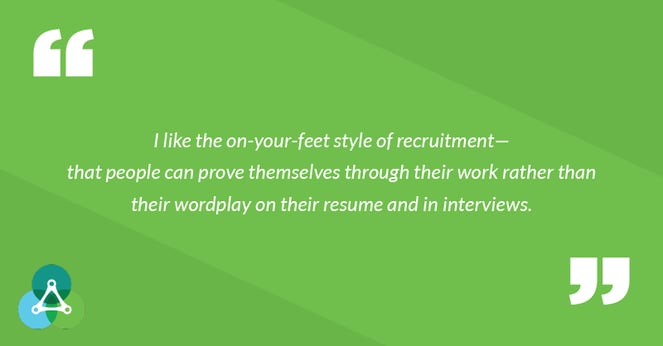
Employers: Ready to learn more about how Micro-Internships can complement your existing recruiting and hiring strategies? Schedule time with our CEO.
Colleges and universities: Interested in learning more about how you can bring Micro-Internships to your campus community? Schedule time with our Director of Partnerships.
Related reading: 2020 Micro-Internship Destination Survey


